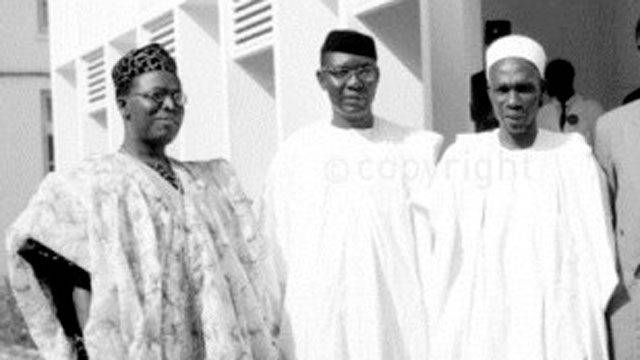The Northern delegation advocates a system of government which differs from anything that has been attempted in Nigeria in the past.
As each region has managed to preserve some measure of order and sense of unity within its confines, each region shall be constituted into an autonomous state:
- The new Nigeria comprise a number of autonomous states.
- The autonomous states of Nigeria ,that is to say,Northern
Nigeria,Eastern Nigeria, Western Nigeria and Mid-Western Nigeria or by whatever name they may choose to be called later and such other states as may be formed subsequently should agree to a union which shall have a Central Executive Council representation to which shall be on equal representation from all the states comprising the Association.

The powers of the Central Executive Council shall be delegated by the component states except that powers connected with external or foreign affairs, immigration can be unilaterally withdrawn by the state Government while all other functions or powers delegated to the Central Executive Council can only be withdrawn by the State Governments after a unanimous decision by their representatives in the Central Executive Council.
- Any member state of the Union should reserve the right to secede completely and unilaterally from the Union and to make arrangements for co-operation with the other members of the Union in such a manner as they may severally or individually deem fit.
- Each state shall have its own Army, Air force, Police, Civil Service and Judiciary.
There shall be a Navy composed ofpersonnel in proportion to the population of each state.
(a) All the States must sign a treaty to defend the country against any external aggression.
(b) Where there is an internal trouble within a state which its forces cannot put down, the State concerned may ask the Central Executive Council to approach the other states to assist.
(c) A system should be worked out whereby installations controlled by the Central Authority are protected wherever such installations are situated.
- There shall be the following common services for the country:
Currency Central Banking, (Communications, Railways, Ports and Harbours, Inland Waterways,Territorial Waters, Airways, Civil Aviation and Merchant Shipping and Central Shipping Lines). Telecommunications and Postal Services, Niger Dam Authority, Weights and Measures, Central Public Service Commission, Foreign Affairs, Foreign Trade, Customs and Excise Immigration and Emmigration. Associate Citizenship, Central Court of Apoeal, Central Capital of Lagos, External Publicity and Information.
- A central Defence Commission or a similar body should be created to eliminate the danger of an arms-race within the association.The commission should have a civilian head and shall not obtain external military aid without the unanimous agreement of all the states. Heads of state Forces shall be included in the membership of the commission.
- Movement from one State to another shall be free.
- Fiscal arrangements in respect of central sources of revenue should be based on the Principle of Derivation.
Rights of Self -determination
Right of self-determination of all people in the country must be accepted and a referendum or plebiscite shall be the method through which the wishes of the people concerned shall be ascertained.These rights include the right of any state within the country to secede. But the implementation of these principles shall not delay the determination of the future of Nigeria. All necessary guarantees shall however be written in the future constitution to establish the right of self-determination by any section.
A recall of the Ad-hoc Conference summoned by the then Lt-Col. Yakubu Gowon about two months after he took over power between September 12 and 28 and again between October 28 and November 4, 1966,would reveal that Northern leaders in the past had taken more radical positions on the constitution of Nigeria than these gentlemen have done.
The four regions in Nigeria mainly North, Mid-Western, West and Eastern Region attended the first session of the conference while no delegation from the East attended the second session of the conference because of the political situation in the country then.
The Northern delegation included Sir Kahim Ibrahim, Alhaji Inua Wada, Mallam Aminu Kano, Chief Joseph Sawuan Tarka, Alhaji Abdul Razak and Chief Josiah Sunday Olawoyin.
The Lagos delegation included Alhaji Femi Okunnu and Alhaji Lateef Jakande. The Eastern delegation was led by Professor Eni Njoku with Chief C.C. Mojekwu, Chief E. Eyo and Chief Matthew Mbu as members.
The Midwest delegation led by Chief Anthony Enahoro also had Dr. Mudiaga Ogie. The Western delegation was led by Chief Obafemi Awolowo and it included Professor Hezekiah Oluwasannmi assisted by Professors Ayo Ogunseye, Sam Aluko and Akin Mabogunje.
The following excerpts from the memorandum by the Northern delegates to the conference show that the raving Governor has no idea where the North stood on critical issues of nationhood.
Source: opera.com